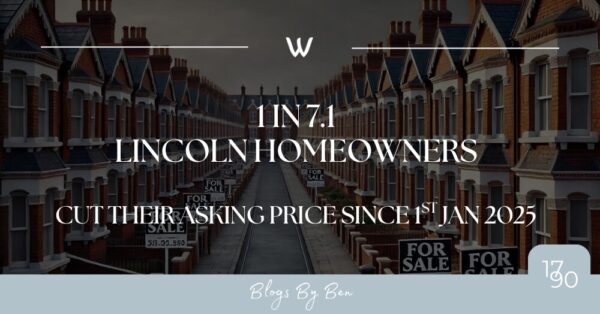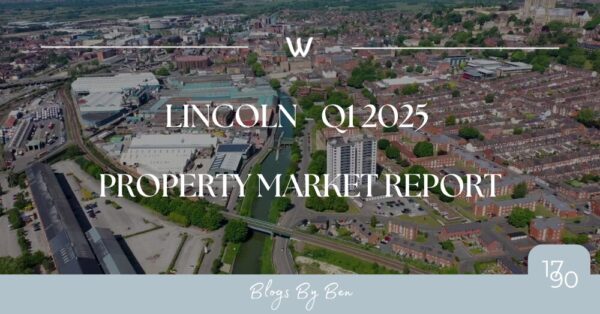The UK property market has seen significant shifts in recent years, particularly during the pandemic.
One of those changes discussed by the Press are the number of properties for sale where the home seller is suffering from ‘buyers regret’. In estate and letting agency online forums, the ‘feeling’ is that there are a lot of properties on the market, where the owner purchased their home during the pandemic years of 2020 and 2021 yet are now back on the market.
There are 694,281 properties currently for sale in the UK and 8.2% (56,931) of them, the owner has only been in their home since the end of the lockdown.
This article will calculate the percentage for Lincoln (as the numbers are much smaller and more interesting to Lincoln people), the reasons behind this trend and its implications for the local housing market.
The Post-Lockdown Buying Frenzy in Lincoln
The pandemic brought unprecedented changes in the British property market. After the first lockdown in spring/early summer 2020, remote working became the norm, and many people re-evaluated their living situation. The desire for more indoor and outdoor space became a priority. This led to a surge in property purchases, particularly in suburban and rural areas. Buyers were eager to escape the confines of inner-city life, seeking more spacious and comfortable homes.
To give you an idea of the numbers, the average number of UK homes sold (including new homes) since 2005 has been 1,169,864 per year (or 292,466 per quarter). Yet, the average quarterly number of UK house sales in the 12 months between Oct 2020 and Sept 2021 was considerably more at 1,553,860 (or 388,465 per quarter).

However, this buying frenzy was driven not just by lifestyle changes but also by favourable economic conditions. Low interest rates and government incentives, such as the stamp duty holiday, made buying a property more attractive than ever. Many people took advantage of these conditions, leading to a boom in property sales.
So, how often do people move home?
Traditionally, homeowners in the UK tend to stay in their properties for a significant length of time. There are 17,693,200 owner-occupied homes in the UK, and in 2023, a total of 1,023,500 (1.02 million) homes were sold.
This 1.02 million figure includes 231,000 new homes, leaving 790,500 sales of existing (second-hand) homes. This is significant because it means that only 4.48% of existing owner-occupiers moved home in 2023, implying that, on average, existing homeowners move every 22 years and 17 weeks.
With this information, one would expect the number of homeowners looking to move so soon after buying their home to be relatively small. Therefore, we decided to analyse the properties for sale in Lincoln and see if the statistics match the anecdotal suggestions.
There are 1,075 properties currently for sale in the Lincoln area.
Out of these, 179 properties were purchased during the pandemic years of 2020/21.
The breakdown of these properties is as follows:
• Detached Lincoln houses: 57
• Semi-detached Lincoln houses: 39
• Terraced Lincoln houses: 37
• Lincoln Apartments: 4
• Lincoln Bungalows: 42
This raises the question:
Why are 8.2% of UK (or 16.6% of Lincoln) homeowners looking to sell so soon after buying?
Several factors could be contributing to this trend:
1. Overestimating the Appeal of Suburban/Rural Living: During the pandemic, moving to a more suburban/rural setting like Lincoln might have seemed idyllic. However, the reality of suburban/rural living—such as longer commutes, fewer amenities, and a different pace of life—might not have lived up to expectations for some homeowners. As a result, they are now looking to move again.
2. Changes in Work Arrangements: While remote working was widely adopted during the pandemic, many companies are now calling employees back to the office, at least part-time. This shift can make living in more remote areas less practical, prompting homeowners to relocate closer to their workplaces.
3. Economic Pressures: The financial landscape has also changed since the height of the pandemic. Rising interest rates will make homeownership less affordable for some people, leading them to sell their properties sooner than planned.
4. Market Opportunities: The current property market might allow Lincoln homeowners to make a profit. With Lincoln property values having increased over the past few years, some owners might be looking to capitalise on this and sell their homes at a higher price.
Implications for the Lincoln Property Market
This higher-than-normal number of properties selling so soon after moving in will undoubtedly increase the number of homes for sale.
The average number of properties for sale in the UK in May 2017 was 568,845; in May 2018, it was 660,019; and in May 2019, it was 667,532 (an overall average of 632,132 for three years combined). In May 2024, it was 694,281 (as mentioned in the introduction).

This increase in the supply of homes for sale means Lincoln house sellers need to be realistic with their asking prices, as the competition is greater.
To back up the idea that realistic pricing is vital if you want to move home, only 53 out of every 100 properties leaving UK estate agents’ books since January 2024 have been sold, exchanged, and completed, while the other 47% have come off the market unsold.
Moreover, this trend could signal a shift in how people view homeownership post-pandemic. The rush to buy during the pandemic might have been more about immediate needs and desires than long-term plans. As the world returns to normalcy, people’s housing preferences and requirements will likely evolve, leading to more dynamic movements in the property market.
Final thoughts –
The trend of pandemic-era homebuyers in Lincoln putting their properties back on the market highlights the fluid nature of the current property market. While the reasons for this trend are varied and complex, it reflects broader changes in how we live and work. As the property market continues to adjust to post-pandemic realities, buyers and sellers in Lincoln must stay informed and adaptable to navigate these changes successfully. One option to stay informed is to follow our agency on social media for more articles like this.
If you are considering moving soon after buying your Lincoln forever home only a few years ago and would like to discuss your options without any obligation, then let’s have a chat. Please don’t hesitate to give me a call on 01522 512 513 or drop me a message on social media.
To ensure ALL our clients get the absolute best experience, and a total marketing strategy as unique as their homes, we only list twenty properties per month, our July & August market appraisal slots are now available to book, we ensure that you are always a name and not just a number, with Walters.




